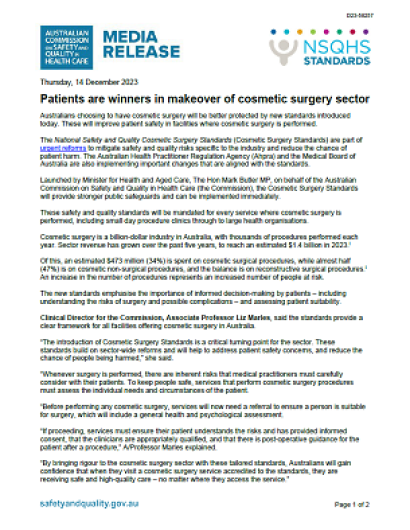Australians choosing to have cosmetic surgery will be better protected by new standards introduced today. These will improve patient safety in facilities where cosmetic surgery is performed.
The National Safety and Quality Cosmetic Surgery Standards (Cosmetic Surgery Standards) are part of urgent reforms to mitigate safety and quality risks specific to the industry and reduce the chance of patient harm. The Australian Health Practitioner Regulation Agency (Ahpra) and the Medical Board of Australia are also implementing important changes that are aligned with the standards.
Launched by Minister for Health and Aged Care, The Hon Mark Butler MP, on behalf of the Australian Commission on Safety and Quality in Health Care (the Commission), the Cosmetic Surgery Standards will provide stronger public safeguards and can be implemented immediately.
These safety and quality standards will be mandated for every service where cosmetic surgery is performed, including small day procedure clinics through to large health organisations.
Cosmetic surgery is a billion-dollar industry in Australia, with thousands of procedures performed each year. Sector revenue has grown over the past five years, to reach an estimated $1.4 billion in 2023.[i]
Of this, an estimated $473 million (34%) is spent on cosmetic surgical procedures, while almost half (47%) is on cosmetic non-surgical procedures, and the balance is on reconstructive surgical procedures.[i] An increase in the number of procedures represents an increased number of people at risk.
The new standards emphasise the importance of informed decision-making by patients – including understanding the risks of surgery and possible complications – and assessing patient suitability.
Clinical Director for the Commission, Associate Professor Liz Marles, said the standards provide a clear framework for all facilities offering cosmetic surgery in Australia.
“The introduction of Cosmetic Surgery Standards is a critical turning point for the sector. These standards build on sector-wide reforms and will help to address patient safety concerns, and reduce the chance of people being harmed,” she said.
“Whenever surgery is performed, there are inherent risks that medical practitioners must carefully consider with their patients. To keep people safe, services that perform cosmetic surgery procedures must assess the individual needs and circumstances of the patient.
“Before performing any cosmetic surgery, services will now need a referral to ensure a person is suitable for surgery, which will include a general health and psychological assessment.
“If proceeding, services must ensure their patient understands the risks and has provided informed consent, that the clinicians are appropriately qualified, and that there is post-operative guidance for the patient after a procedure,” A/Professor Marles explained.
“By bringing rigour to the cosmetic surgery sector with these tailored standards, Australians will gain confidence that when they visit a cosmetic surgery service accredited to the standards, they are receiving safe and high-quality care – no matter where they access the service.”
Australia has had nationally consistent standards in hospitals and day procedure services for 11 years, with the National Safety and Quality Health Service (NSQHS) Standards.
The new standards bring the cosmetic surgery industry into line with all other day procedure services nationwide. The Commission anticipates most services will be accredited to the new standards by 2025.
A/Professor Marles said: “Anyone undergoing an invasive surgical procedure should be able to expect that the treatment they receive is safe, appropriate and respectful. By implementing these standards, cosmetic surgery services will be able to demonstrate the scrupulous care of their patients.
“There are too many cases where cosmetic surgery procedures have had poor or tragic outcomes for vulnerable people who were unaware of the risks. These standards are a powerful lever for change.”
Specialist plastic surgeon Dr Garry Buckland, a Director of the Australasian Foundation for Plastic Surgery, said the standards provide a framework for "gold standard clinical practice in a field that has lacked direction for too long”.
“The Cosmetic Surgery Standards will benefit people choosing to have cosmetic surgery in an accredited facility, as they will be able to distinguish a good-quality practice from a poor-quality practice,” he said.
“The reputation of cosmetic surgery and the integrity of those who practice it has reached an all-time low. These standards, combined with reforms from Ahpra and the Medical Board of Australia, are necessary to restore patient and community confidence in cosmetic surgery and the medical practitioners who provide these services.
“Compliance to the Cosmetic Surgery Standards is a win-win for patients, practitioners and the broader community. Facilities that prioritise patient safety will be keen to implement these standards as soon as practicable, so we should see a positive impact on the industry very quickly.”
Dr Buckland added: “It is important that people who choose to have cosmetic surgery can trust that the services and medical practitioners they use are accountable, qualified and will provide safe care.”
“In a field that has lacked regulatory rigour, patients can be reassured by these standards that they will be able to receive the best possible care, in a safe environment, by trained medical professionals.”
Tune in at 12:00pm AEDT today, Thursday 14 December
To register for the webcast and find more information about the standards, visit: https://safetyandquality.tv/cosmetic-surgery/



